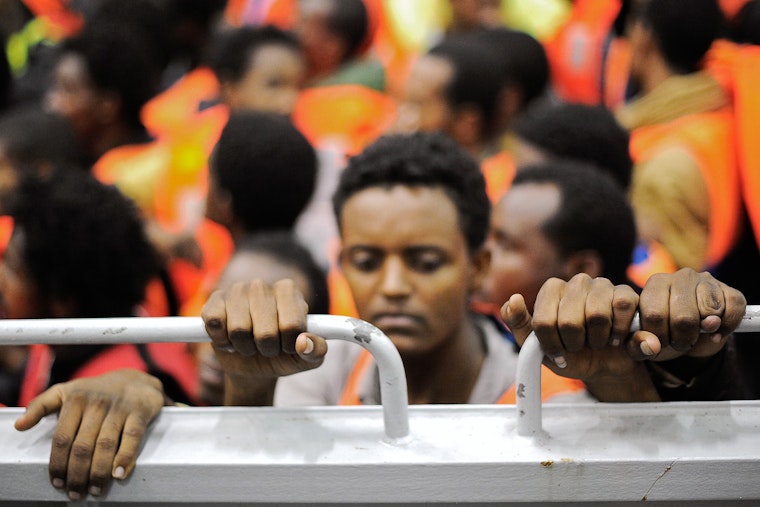October 3 Could Become an Official Day to Remember Fallen Migrants
By Tareke Brhane

As many as 900 migrants died attempting to cross the Mediterranean Sea in April while seeking a better life away from their conflict-torn countries. Incidents like these have made it impossible for Europeans to keep ignoring a rapidly escalating crisis. For the people on those boats—and for all those who over the years have risked their lives to reach Europe’s shores—the time for rhetoric has passed, and the time for real solutions has arrived.
I could have been one of those migrants who lost their lives at sea last month. I am an Eritrean refugee who 10 years ago escaped to Italy from a dictatorship and forced, lifelong military conscription. I was born in Eritrea where I studied and worked from the age of 10 to support my mother. I fled the country at 17, leaving behind my family—the hardest decision of my life—and risking my life in the hands of traffickers.
My journey to Europe lasted several years and was filled with dangers. I faced violence, imprisonment, and the threat of death while traversing Sudan and Libya. During my first attempts to cross the Mediterranean, I was rejected and turned back several times until I finally managed to reach Sicily at the end of 2005.
I was among the lucky few who survived. Since then, I have committed my life to helping those who have been forced to face similar life-threatening journeys to escape unbearable situations.
Based in Rome, I lead the October 3 Committee (Comitato Tre Ottobre–Accoglienza), a nonprofit organization set up by a group of journalists and activists—both Italian and refugees. It was founded in the aftermath of the 2013 tragedy in Lampedusa, Italy, where 368 people lost their lives trying to travel from Libya to Europe. The aim of our organization is to establish October 3 as the Day of Remembrance and Hospitality; to commemorate migrants and asylum seekers who have perished while attempting to flee persecution, dictatorships, war, and misery; and honor the men and women who risk their lives each day to save them.
The Italian Parliament is currently discussing a draft law recognizing October 3 as an annual remembrance day. The proposal has already been approved by the Italian Chamber of Deputies; we are now waiting for the Senate’s approval so that the draft can become law.
This is our way of bringing attention to the phenomenon of migration and forced migration. A remembrance day is not merely symbolic. It is an opportunity to involve the younger generations in awareness-raising initiatives that lead to greater civic consciousness. We involve local communities, schools, and civil society groups in Italy and beyond to promote a culture of hospitality, protection of human rights, and the prevention of another tragedy in the Mediterranean or elsewhere.
Second, the October 3 Committee calls for the opening of “humanitarian corridors” that can facilitate asylum seekers’ entry to Europe without needing to resort to human traffickers. For example, this could involve EU countries issuing temporary humanitarian visas before their trip so migrants who have the right to asylum are not forced to enter Europe irregularly.
Our third focus is the identification of victims who lost their lives in the Mediterranean and trying to give them a dignified burial. We represent the requests of families for clear and immediate identification procedures of all bodies of migrants recovered at sea. The families have the right to a place to mourn their loved ones.
In the last 20 years, over 20,000 migrants and refugees have died while trying to reach safety in Europe. Until last month, the shipwreck off Lampedusa was the only one of these disasters to truly sustain the world’s attention. In 2014, on the first anniversary of the tragedy, we organized two days of activities on the island of Lampedusa. Participants included survivors, family members of the victims, and European and Italian institutions and civil society.
The scale of April’s tragedy prompted European leaders to pledge additional funding for search and rescue operations in the Mediterranean. In four days, more than 380,000 people signed our petition to demand that EU governments strengthen the deployment search and rescue missions in the Mediterranean, as well as create legal channels to prevent those fleeing conflict and persecution.
We want others to join us to create a strong and widespread movement that pushes national and European institutions towards a change of course in migration policies and the right to asylum. Dignity and safety is the right of all.
The October 3 Committee is a grantee of the Open Society Foundations. Tareke Brhane was awarded the Peace Summit Medal for Social Activism for his work on refugee rights in Italy.
Tareke Brhane is the founder of the October 3 Committee.